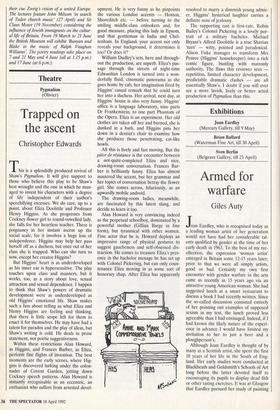Theatre
Pygmalion (Olivier)
Trapped on the ascent
Christopher Edwards
This is a splendidly produced revival of Shaw's Pygmalion. It will give support to those who believe this play to be Shaw's best wrought and the one in which he man- aged to invest his characters with a degree of life independent of their author's speechifying excesses. We do care, up to a point, about Eliza Doolittle and Professor Henry Higgins. As she progresses from Cockney flower girl to round-vowelled lady, she falls for her heartless teacher. There is poignancy in her instant ascent up the social scale, for it involves a huge loss of independence. Higgins may help her pass herself off as a duchess, but once out of her class she is trapped. Who can she turn to now, except her creator Higgins?
But Higgins' heart is as underdeveloped as his inner ear is hypersensitive. The play touches upon class and manners, but it works, too, as a story about love, sexual attraction and sexual dependence. I happen to think that Shaw's powers of dramatic development were as underdeveloped as old Higgins' emotional life. Shaw makes such a fuss about telling us what Eliza and Henry Higgins are feeling and thinking, that there is little scope left for them to enact it for themselves. He may have had a talent for paradox and the play of ideas, but Shaw's writing is cold. He deals in prose statement, not poetic suggestiveness.
Within these restrictions Alan Howard, as Higgins, and Frances Barber, as Eliza, perform fine flights of invention. The best moments are the early scenes, where Hig- gins is discovered lurking under the colon- nades of Covent Garden, jotting down Cockney speech patterns. Alan Howard is instantly recognisable as an eccentric, an enthusiast who suffers from arrested devel-
opment. He is very funny as he pinpoints the various London accents — Hoxton, Shoreditch etc. — before turning to the smiling middle-class onlookers and, for good measure, placing this lady in Epsom, and that gentleman in India and Chel- tenham. In England, your accent not only reveals your background, it determines it too? Or does it?
William Dudley's sets, here and through- out the production, are superb. Eliza's pas- sage through the streets of night-time Edwardian London is turned into a won- derfully fluid, cinematic panorama as she goes home by cab, her imagination fired by Higgins' casual remark that he could turn her into a duchess. Her arrival, next day, at Higgins' house is also very funny. Higgins' office is a language laboratory, nine parts Dr Frankenstein, to one part Phantom of the Opera. Eliza is an experiment. Her old clothes are taken off her and burned, she is dunked in a bath, and Higgins pins her down in a dentist's chair to examine how she produces those penetrating, cat-like howls.
All this is lively and fast moving. But the piece de resistance is the encounter between a not-quite-completed Eliza and nice, drawing-room conversation. Frances Bar- ber is brilliantly funny. Eliza has almost mastered the accent, but her grammar and her topics of conversation betray the flower girl. She comes across, hilariously, as an upwardly mobile android.
The drawing-room ladies, meanwhile, are fascinated by this latest slang, and decide to learn it too.
Alan Howard is very convincing indeed as the perpetual schoolboy, dominated by a powerful mother (Gillian Barge in fine form), but tyrannical with other women. Fine actor that he is, Howard deploys an impressive range of physical gestures to suggest gaucheness and self-obsessed dis- traction. He comes to treasure Eliza's pres- ence in the bachelor menage he has set up with Colonel Pickering, but can only coun- tenance Eliza moving in as some sort of honorary chap. After Eliza has apparently resolved to marry a dimmish young admir- er, Higgins' hysterical laughter carries a definite note of jealousy.
The supporting cast is first-rate. Robin Bailey's Colonel Pickering is a lovely por- trait of a military bachelor. Michael Bryant's Alfred Doolittle is a true Shavian 'turn' — witty, pointed and paradoxical. Alison Fiske manages to transform Mrs Pearce (Higgins' housekeeper) into a rich comic figure, bustling with matronly authority. The flaws this reviewer sees repetition, limited character development, predictable dramatic clashes — are all essentially Shaw's. I doubt if you will ever see a more lavish, lively or better acted production of Pygmalion than this.


















































 Previous page
Previous page